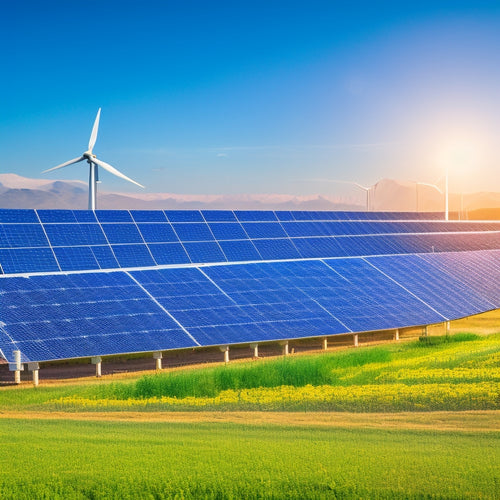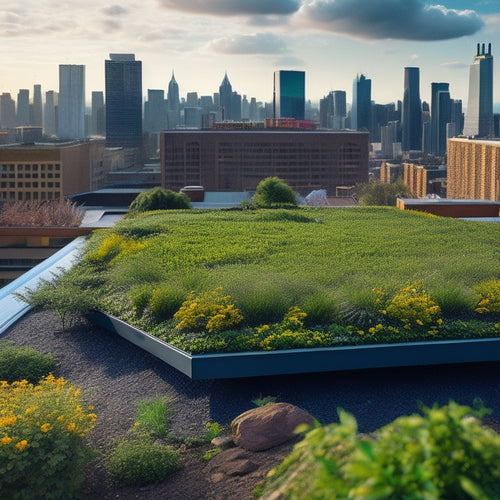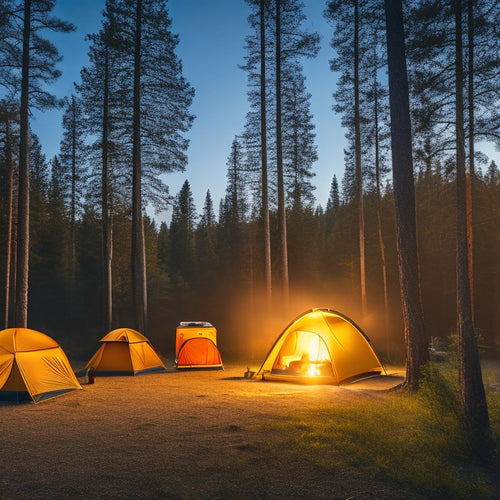
Why Optimize Your Energy Efficiency Now?
Share
You're currently wasting up to 30% of the energy consumed in your home or business due to inefficiencies, resulting in unnecessary expenses and environmental damage. By optimizing your energy efficiency now, you can reduce your energy consumption by up to 30%, leading to significant cost savings on utility bills and a minimized carbon footprint. Simple DIY fixes like sealing air leaks, switching to LEDs, and adding insulation can make a big impact. Identifying hidden energy leaks and conducting a DIY home energy assessment can also help you pinpoint areas for improvement. By taking action now, you'll not only save money but also contribute to a cleaner, healthier planet - and there's more to uncover in your path towards energy efficiency.
Overview
- Optimizing energy efficiency reduces energy waste, lowers utility bills, and contributes to a cleaner, healthier planet.
- Energy-efficient upgrades can save up to 30% of energy consumption, resulting in significant cost savings and a reduced carbon footprint.
- Identifying and addressing hidden energy leaks in homes can lead to long-term financial benefits and a more sustainable living space.
- Simple energy-saving hacks, such as adjusting daily habits and sealing air leaks, can save up to 10% of energy bills.
- Preparing for an energy audit helps identify areas for improvement, maximizes the benefits of energy-efficient solutions, and leads to a more energy-efficient home.
Energy Waste Identification Methods
Many industrial facilities waste a significant amount of energy due to inefficient systems and practices. You can identify these energy-wasting areas by utilizing advanced energy monitoring tools, which provide real-time data on energy consumption patterns.
These tools help you pinpoint specific areas of inefficiency, allowing you to take targeted corrective actions. By leveraging Advanced Data Analytics Platforms, you can gain granular perspectives into energy consumption and optimize energy yield.
Another effective method is thermal imaging, which uses infrared cameras to detect heat losses in buildings, equipment, and processes. This visual representation of energy waste enables you to identify opportunities for improvement, such as insulation gaps or inefficient HVAC systems.
Easy DIY Energy Efficiency Fixes
You can make a significant impact on your energy consumption by tackling a few simple DIY projects.
Start by sealing air leaks to prevent heated or cooled air from escaping, then switch to LEDs to reduce your lighting energy usage.
Consider optimizing your solar panel angles to maximize energy harvesting, and guarantee regular cleaning to maintain peak performance.
Next, add insulation to your attic, walls, or floors to minimize heat transfer and optimize your home's energy efficiency.
Seal Air Leaks Fast
Every small gap and crack in your home's envelope allows heated or cooled air to escape, wasting energy and increasing your utility bills. You can easily seal these air leaks with a few DIY fixes. Start by inspecting your home's exterior and interior for gaps around windows, doors, electrical outlets, and switches. Then, use weather stripping to seal gaps around moving parts like doors and windows. For stationary gaps, use caulking to fill in cracks and crevices.
| Area | Material Needed | Fix |
|---|---|---|
| Windows | Weather stripping | Apply around sashes and frames |
| Doors | Weather stripping | Apply around door frames and thresholds |
| Electrical Outlets | Caulk | Fill gaps around outlets and switches |
Switch to LEDs
Because lighting accounts for a considerable portion of your home's energy consumption, swapping traditional incandescent bulbs for LEDs can make a considerable impact on your energy efficiency.
LED advantages are numerous, including their ability to use notably less energy than incandescent bulbs. In fact, LEDs use up to 90% less energy, resulting in substantial cost savings over time.
Additionally, LEDs have a longer lifespan, typically lasting 15,000 to 25,000 hours compared to incandescent bulbs' 1,000 to 2,000 hours. By switching to LEDs, you'll not only reduce your energy consumption but also reduce your maintenance costs.
Moreover, embracing energy autonomy through solar power systems can lead to a considerable reduction in monthly utility bills, ensuring predictable cost savings and better budgeting.
With these benefits, it's clear that making the switch to LEDs is a simple yet effective way to optimize your energy efficiency and save money in the long run.
Add Insulation Now
Proper insulation is an essential component of an energy-efficient home, as it helps reduce heat loss in the winter and heat gain in the summer.
You can choose from various insulation types, including fiberglass batts, spray foam, and radiant barrier insulation.
By adding insulation to your attic, walls, and floors, you'll reap numerous benefits.
Insulation helps reduce your energy consumption, which leads to lower utility bills and a smaller carbon footprint.
It also makes your home more comfortable by maintaining a consistent temperature and reducing noise pollution.
Take control of your energy efficiency and freedom by insulating your home now.
With the right insulation, you'll enjoy long-term savings and a more sustainable living space.
Hidden Energy Leaks in Homes
One of the most significant energy-wasting culprits in your home is likely hiding in plain sight. You mightn't notice it, but air leaks and heat loss can be silently draining your energy resources.
Thermal imaging can help you identify these hidden leaks, revealing areas where warm air is escaping or cold air is seeping in. Draft detectors can also be used to pinpoint gaps and cracks around windows, doors, and electrical outlets.
By using these tools, you'll be able to detect energy leaks that would otherwise go unnoticed. For instance, you might find that your attic insulation is compromised or that your windows need resealing.
Benefits of Energy Efficient Upgrades
By addressing those hidden energy leaks, you've taken the first step towards optimizing your energy efficiency.
Now, it's time to reap the benefits of energy-efficient upgrades. By investing in energy-efficient solutions, you'll enjoy significant cost savings on your utility bills. In fact, studies have shown that energy-efficient upgrades can reduce energy consumption by up to 30%, resulting in substantial financial savings.
Furthermore, these upgrades will also minimize your environmental impact, reducing your carbon footprint and contributing to a cleaner, healthier planet.
Simple Energy Saving Hacks
Switch to energy-saving mode with these simple hacks that can make a significant difference in your energy consumption.
Start by adjusting your daily habits, such as turning off lights, electronics, and appliances when not in use. This simple energy conservation technique can save up to 10% of your energy bill.
Additionally, consider conducting a DIY home energy assessment to identify areas of improvement in your home. Check for air leaks, inspect your insulation, and seal any gaps to prevent heat loss.
Preparing for an Energy Audit
You've taken the first step towards energy efficiency by adopting simple habits and conducting a DIY home energy assessment.
Now, it's time to prepare for a professional energy audit. Audit preparation is vital to guarantee you get the most out of the process. Start by gathering your energy bills from the past year to identify patterns and areas of improvement.
Next, create an energy audit checklist to guarantee the auditor covers all essential areas, including insulation, windows, and HVAC systems.
Make certain to clear clutter and provide access to all areas of your home, including attics, basements, and crawlspaces.
Frequently Asked Questions
What Is the Average ROI for Energy-Efficient Home Upgrades?
You'll see an average ROI of 8-12% for energy-efficient home upgrades, with some projects offering higher returns. This translates to average savings of $300-500 per year, leading to long-term benefits that'll give you financial freedom and peace of mind.
Can Energy Efficiency Improvements Increase My Home's Value?
You're polishing a gem, refining your home's finer points, and energy efficiency upgrades can be the crowning jewel, greatly enhancing your home's value and resale potential, making it a coveted treasure in the real estate market.
How Long Do Energy-Efficient Appliances Typically Last?
You'll find that energy-efficient appliances typically last 10-20 years, with some lasting up to 30 years, providing extended appliance lifespan and significant energy savings, giving you more freedom to enjoy your life without constant replacements and utility bill worries.
Are Energy-Efficient Upgrades Eligible for Tax Credits?
You'll be pleased to know that many energy-efficient upgrades qualify for tax credits, offering significant savings. Check the IRS's energy saving incentives to see if your eco-friendly investments meet tax credit eligibility, and reap the benefits of going green.
Do Energy Audits Require Any Special Preparation or Equipment?
When you schedule an energy audit, you'll need to prepare by gathering past energy bills and ensuring access to all areas of your home; the auditor will bring necessary equipment, such as infrared cameras and blower doors, to detect energy losses.
Ready to Buy
As you flip the switch to energy efficiency, imagine the weight of wasted resources lifting off your shoulders. Your home, once a energy-guzzling machine, is now a finely-tuned instrument, humming with eco-friendliness. By identifying hidden leaks, implementing easy fixes, and embracing upgrades, you're not only saving the planet, but also padding your wallet. The future is bright, and with every energy-efficient step, you're illuminating the path to a sustainable tomorrow.
Related Posts
-

The Role of Battery Monitoring Systems in Renewable Energy
Battery monitoring systems play an essential role in renewable energy by enhancing system longevity and optimizing pe...
-

Designing a Green Roof for Maximum Energy Efficiency
Designing a green roof for maximum energy efficiency involves several key strategies. Start by selecting native, drou...
-

Top Solar Powered Camping Fans for Camping Enthusiasts
If you're a camping enthusiast, a solar-powered fan can be a transformative element for your outdoor experience. Thes...


